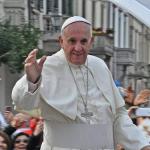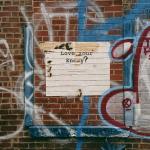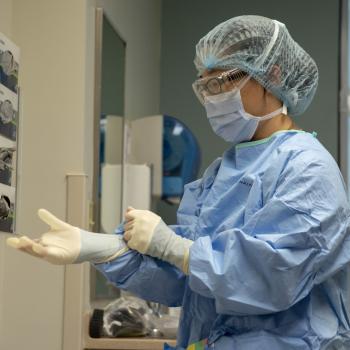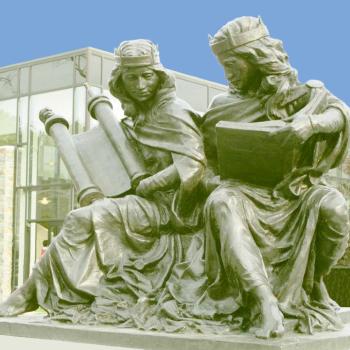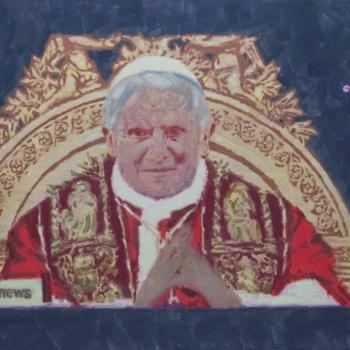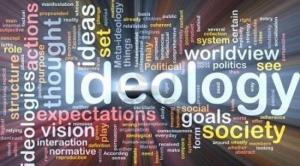
While we often find conflict between people of science and people of faith, such conflict, for the most part, should not exist. The problem lies, not in science, nor in religion, but in ideology, that is in the way some people take a fundamentalistic, rigid approach to some element of faith or science and absolutize it in a way which undermines the fullness of the truth itself. That is, the problem lies with fundamentalism, especially religious fundamentalism, and the way someone holds on to what they believe to be true without a willingness to accept correction. They confuse their own belief, their own way of understanding the truth, as being the absolute truth itself, and so form and establish an ideology, an ideology which then resists any difference in opinion or understanding. Some who embrace the way of science, as a result of listening to religious fundamentalists, will repudiate religion, thinking they represent what religion teaches and upholds, and once this happen, we see the way science begins to be pitted against religion, It is all a misunderstanding based upon a bad presentation of religion.
This is not as it should be. Science and religion have their own domains, their own foundational premises, and their own ways of engaging data; science has credibility in regards its domain and people of faith should not resist what science is able to determine, but rather, they should learn from science and use what they learn to further engage and develop their faith. Scientists, of course, should also understand the limits of their domain, and not try to over-extend it; most of them do not, rather, it is those who misunderstand science and follow the path of fundamentalism, using science instead of religion, who create the ideology of scientism which serves no one any good. Nonetheless, even if men and women of science, and their followers, over-extend the implications of their discoveries, engaging, as it were, bad philosophy or hermeneutics, what they have discerned and discovered has value, and instead of engaging some sort of simple dismissal when they see such scientism at play, people of faith should learn from and engage the sciences for themselves instead of dismissing them and appearing ignorant and backward as a result. Al-Ghazālī understood there could be, and would be, great harm done to religion when religious people attack science when it is following its proper real of study:
Whoever thinks that to engage in a disputation for refuting such a theory is a religious duty harms religion and weakens it. For these matters rest on demonstrations – geometrical and mathematical – that leave no room for doubts. Thus, when one who studies these demonstrations and ascertains their proofs, deriving thereby information about the time of two eclipses [and] their extent and duration, is told that this is contrary to religion, [such an individual] will not suspect this [science, but] only religion. The harm inflicted on religion by those who defend it in a way not proper to it is greater than [the harm caused] by those who attack it in the way proper to it. As it has been said: “A rational foe is better than an ignorant friend.” [1]
And, as he also noted, such an approach to science ultimate will help serve atheists, who will use the ignorance coming from religion to question religion as a whole:
The greatest thing in which the atheists rejoice is for the defender of religion to declare that these [astronomical demonstrations] and their like are contrary to religion. Thus, the [atheist’s] path for refuting religion becomes easy if the likes [of the above argument for defending religion] are rendered a condition [for its truth]. [2]
To be sure, science itself is a pursuit of the truth; it takes what has already been learned or ascertained, suggests what seems most probable with the data we have, and uses that to promote new research and scientific advances, advances which, as St. Gregory of Nyssa understood, should not serve as an end point of knowledge but rather the foundation for further development of our knowledge:
It seems right to me that those who have adopted this starting point should not reject what follows sequentially from their inquiry; that is, what science, which guises us towards truth, is moving towards, by considering what is probable. [3]
All sciences, to be sure, builds upon what came before, refining their findings, allowing us to come to greater and greater knowledge, greater and greater understanding of the world around us. That pursuit will likely be a never-ending pursuit, as what is left for us to know and come to understand is infinite.
Trusting in science is trusting in the process of science, and that process includes understanding all science begins with a given and proceeds from it; without this foundation, we will get things wrong and make bad assumptions which easily would lead us to a fundamentalistic dead end, or, as Pavel Florensky said, a “dead and harmful ballast”: “Understand that starting any science without previously acquired materials is not the right way to go about the thing. This creates a dead and harmful ballast, and not knowing how to digest new information, students remain forever with their head constipated.” [4]
The fact that science requires this is not a bad thing, but rather, it is a good thing, for it shows it is willing to be refined and corrected, something which it seems many people of religious faith are unwilling to do. And yet, though the principles and foundations might differ, faith itself allows us to have a faith seeking understanding, and with that pursuit of understanding, to find itself developing new and better insights. In reality, living religion should develop along the same lines as the sciences, and not allow itself to come to a fundamentalistic dead end. Bernard Lonergan’s Method in Theology should be intuitive to people of faith, and yet, it is not; too many do not understand that there is a logical method being used to engage religious faith, and over time, that engagement leads to new insights. Sadly, the same can be said with the way some have come to treat science. What is important, for religion or for science, is the willingness to learn, to adapt, to develop, to make sure there is no dead end which develops, a dead end which undermines what science and religion should be doing.
Ideology, and the fundamentalism which fuels it, is a problem. It is an over-assertion of knowledge. The solution to it is not to engage its exact opposite, that is, it is not found in an embrace of pure, absolute skepticism which always questions everything, including the basic foundations which have been sufficiently established or proven. While, there can be re-examinations of the processes we used to get to where we are today, and there can be refinement when this is done, the basics have to be readily accepted if we are to ever go forward: once it has been proven that the earth is not flat, it would be foolish to go back and question the scientific advances which prove it is not flat, and the same, can be said, to be true in regards people of faith when dealing with their faith traditions if they want to continue to uphold those traditions. This is not to say all developments are good or true, for mistakes will happen, but for questions to be taken seriously, they require verifiable evidence which shows a particular line of development is flawed.
The problem we see is that so many people of religion have ignored development in their own tradition, and are backward, coming, that is, to an ideological dead-end. They hold that ideology up above all things. They interpret all things in relation to it. If anything challenges it, they push back, and the more the evidence stands against their ideology, the more they push back and embrace skepticism, or worse, conspiracy theories, to explain their defiance to the facts at hand. They are unwilling to accept evidence which requires them to change their point of view. That is what many non-religious believes do not understand when they see a conflict between science and religion. It is not religion as much as entrenched ideology which is the problem. Those who use religion against science represent a dead end, not just scientifically, but religiously. And so, what is important is for people of faith to stand against that backward turn, to show, like Al-Ghazālī, how absurd it is, from a religious perspective, to stand against science and its determinations. People of faith have got to work with and learn from science, to come to understand what scientists have learned; they should accept that science serves as a legitimate complement to their knowledge. Science, that is, empirical science, is limited in its domain; it doesn’t need religion to exercise its methodology. It is secondary interpretation of that data, where one tries to engage what science has learned, and try to find what it means in relation to the greater, absolute truth, where we find empirical science cannot give a proper answer. This is where religion, and philosophy, has value; religion provides people of faith a hermeneutic to use to establish such ultimate meaning for themselves in their lives. People without religious faith, to be sure, tend to have their own philosophical viewpoint which also helps them find such meaning for themselves. What is important is the realization that we must not confuse such meaning, whatever it is, with science, just as we should not confuse the interpretation of a text with the text itself.
Science and religion do not have to be rivals; rather, they should be understood as working with and engaging different aspects of knowledge and how to interpret it. When one or the other, but mostly people of religious faith, pit them against each other, we all lose out
[1] Al-Ghazālī, The Incoherence of the Philosophers. Trans. Michael E. Marmura (Provo, Utah: Brigham Young University Press, 2000), 6.
[2] Al-Ghazālī, The Incoherence of the Philosophers, 7.
[3] St. Gregory of Nyssa, On the Six Days of Creation. Trans. Robin Orton (Washington, DC: CUA Press, 2021), 90.
[4] Pavel Florensky, Letters from the Gulag. Trans. Adela Lawless (No City: Independently Published, 2020), 20 [To Olchecka, Nov. 12, 1933].
Stay in touch! Like A Little Bit of Nothing on Facebook.
If you liked what you read, please consider sharing it with your friends and family!
N.B.: While I read comments to moderate them, I rarely respond to them. If I don’t respond to your comment directly, don’t assume I am unthankful for it. I appreciate it. But I want readers to feel free to ask questions, and hopefully, dialogue with each other. I have shared what I wanted to say, though some responses will get a brief reply by me, or, if I find it interesting and something I can engage fully, as the foundation for another post. I have had many posts inspired or improved upon thanks to my readers.


